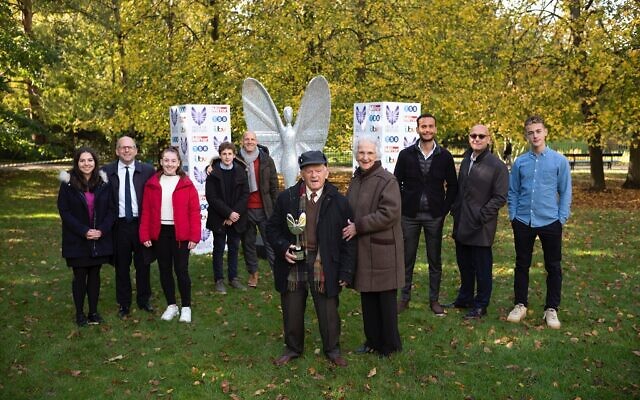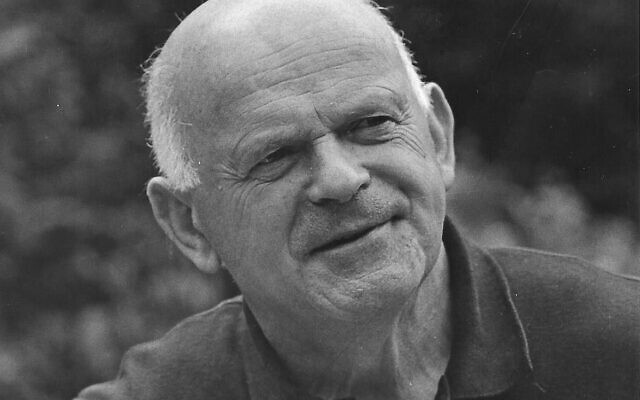Former Olympian, Holocaust Survivor Helfgott Dies at 93
The Polish-born Holocaust survivor passed away at his home in London on June 16.

Ben Helfgott, a Polish-born Holocaust survivor, who was emancipated from the Theresienstadt labor camp and ghetto in Czechoslovakia in 1945 before immigrating to Britain where he became an Olympic weightlifter and, ultimately, an unflagging advocate for Holocaust survivors, died on June 16 at his home in London.
Helfgott, one of two known Holocaust survivors to go on to compete in the Olympics, was 93 and is survived by his wife, Arza (Gordon) Helfgott; three sons, Maurice, Michael, and Nathan; sister, Mala Tribich; and nine grandchildren.
Maurice was the first to confirm his father’s death, but did not mention a cause.
Helfgott’s rise to athletic stardom was just as improbable as it was remarkable. In 1948 – merely three years after being freed from Nazi imprisonment with an 80-pound skeletal frame – a 19-year-old Helfgott was walking around a London park when he passed by some weightlifters pumping iron. Intrigued, Helfgott asked if he could try lifting the 180-pound barbell over his head. He did so effortlessly, immediately realizing his boundless potential as a weightlifter. Soon thereafter, he committed himself to training three nights a week after school and embarking on what turned out to be a phenomenal amateur weightlifting career.
For it was less than a decade later, at the 1956 Summer Olympics in Melbourne, Australia, during which the Opening Ceremony coincided with his 27th birthday, that he finished 13th in his weight class. Melbourne wouldn’t be his only Olympics. Four years later during the Summer Games in Rome, Helfgott once again captained the British weightlifting team, this time finishing 18th in his class.

When reflecting on his Olympic glory to The Times of London in 2021, Helfgott, who also captured four British weightlifting titles and the gold medal in the lightweight class thrice at the Maccabiah Games, which earned him induction into the International Jewish Sports Hall of Fame in 1995, said, “I felt like I was representing all the talent that was unable to reach its potential because of the Nazi horror.”
Tragically, many members of Helfgott’s family did not reach their full potential because of the Nazis. Both his parents, one of his two sisters, and 21 of his 24 cousins perished in the Holocaust. Painful, yet bittersweet memories of his late family manifested themselves sharply during the aforementioned opening to the Melbourne Games that segued into his first taste of Olympic competition.
“I thought of my parents and of how proud they would have been of me,” Helfgott also shared with The Times of London. “I was at the point of death, but here I was alive and kicking, representing my adopted country. There was sadness but also exhilaration.”
Helfgott was born in Pabianice, a Polish city near Lodz, on Nov. 22, 1929, and raised in Piotrkow. Shortly before his 10th birthday, the Nazis stormed into Poland, effectively initiating World War II and forcing Ben and his family to flee their home village and find refuge in a forest. They weren’t there long. Along with other Jewish families, the Helfgotts were soon forced into the Piotrkow ghetto, where nearly 20,000 Jews languished in pitiful conditions.
Several months after, Ben, who worked as an adolescent at a glass factory in the ghetto, and his family, eluded a mass deportation in late 1942, as his mother and one of his sisters were rounded up along with hundreds of other detainees and murdered in a nearby forest. In 1944, Ben and his father were deported to Buchenwald in Germany; while Ben was then transferred to a subcamp, Schlieben, and later, to Theresienstadt, his father stayed at Buchenwald and ultimately perished days before what would have been his liberation as he was caught trying to bolt from a death march.
I thought of my parents and of how proud they would have been of me. I was at the point of death, but here I was alive and kicking, representing my adopted country. There was sadness but also exhilaration.
An emaciated teenager at the conclusion of the war, Helfgott was one of 732 orphaned camp survivors, all under 16 and mostly boys, who were transported to England by the Central British Fund, a relief agency for Jewish refugees, where they enjoyed classes and outings that instilled a sense of normalcy back into their lives.
“During the day, anybody who observed us would never have believed what we went through,” Helfgott told the BBC in a 2007 interview about his post-war experience with his fellow young survivors. “But there was another story when we went to sleep. That’s when things happened because most of us were still living with the trauma. And I was living with a terrible trauma because I kept thinking about my father.”
Helfgott urged many of the “Boys” to share their similarly harrowing experiences with the pre-eminent British historian Martin Gilbert, who eventually chronicled their stories in his noted book, “The Boys: The Untold Story of 732 Young Concentration Camp Survivors,” published in 1997.
“There is something different about them from older survivors,” Gilbert told The New York Times when his tome came out that year. “The older survivors came out of the camps as individuals. This group stayed together for three, four, five years. It seemed to have given them a sort of collective strength. They were never without someone who understood.”
Later in life, while working as a clothing manufacturer, Helfgott dedicated his post-Olympic career toward making sure more people understood about the horrors that he and his contemporaries experienced under the Nazis. To do so, he founded and later became chairman of the ’45 Aid Society – comprised of other members of “The Boys” – whose primary mission was to enlighten the masses about the atrocities committed and emphasize that such a genocide must never be permitted to happen again to any group, anywhere on the planet.
In August 2005, Poland’s highest civilian award, the Commander’s Cross of the Order of Merit, was bestowed on Helfgott for his tireless efforts in promoting Holocaust education and easing Polish-Jewish relations. The following decade, in 2018, he was knighted by Prince Charles at Buckingham Place.
“Sir Ben Helfgott was one of the most inspirational people I have known,” said Britain’s Chief Rabbi Ephraim Mirvis upon learning of Helfgott’s passing, according to London’s Jewish News. “He was a charismatic and passionate leader, who promoted the values of compassion, understanding, love and peaceful coexistence. His own horrific experiences inspired him to work tirelessly for a more peaceful and unified world and he inspired us to do likewise.”
- Sports
- Community
- David Ostrowsky
- Ben Helfgott
- Holocaust Survivor
- Theresienstadt
- Olympic weightlifter
- Nazi
- 1956 Summer Olympics
- Maccabiah Games
- International Jewish Sports Hall of Fame
- World War II
- Piotrkow ghetto
- Buchenwald
- Central British Fund
- Martin Gilbert
- ’45 Aid Society
- Commander’s Cross of the Order of Merit
- Rabbi Ephraim Mirvis



comments